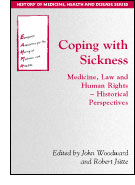
BBR Academic Bookshop Home Full Search Full Title List Place Your Order BBR Catalogue General Pages: Privacy Policy Terms of Business Help & FAQ |
Coping with Sickness: Medicine, Law and Human Rights
|
| Edition | Our Price inc. p&p | Status |
| hardback, xii+211pp, ISBN 0953652203, 2000 | UK only: £24.95 | in stock |

| Other volumes in the EAHMH History of Medicine, Health and Disease Series: |
Each volume in the EAHMH History of Medicine, Health and Disease Series combines original papers presented at its bi-annual meetings with other invited contributions reflecting the interdisciplinary approach which is characteristic of the Association's research initiatives.
This major publication contains essays by leading scholars based on material first presented at the third and final conference in the "Coping with Sickness" series, held in Castelvechio di Pascoli in Italy in 1997, plus full index and consolidated bibliography.
Contents:
- John Woodward, "Medicine, Law and Human Rights"
- Jose Pardo-Tomas & Alvar Martinez-Vidal, "Victims and Experts: Medical Practitioners and the Spanish Inquisition"
- Cay-Rudiger Prull, "No Law, No Rights? Autopsy in Germany since 1800"
- Angus McLaren, "Vacher the Ripper and the Construction of the Nineteenth-Century Sadist"
- Willem de Blecourt, "Prosecution and Popularity: the Case of the Dutch Sequah, 1891-1893"
- Cornelie Usborne, "Female Voices in Male Courtrooms - Abortion Trials in Weimar Germany"
- Helen Power, "'For their own good': Drug Testing in Liverpool, West and East Africa, 1917-1938"
- Roger Davidson & Lutz D.H. Sauerteig, "Law, Medicine and Morality: A Comparative View of Twentieth-Century Sexually Transmitted Disease Controls"
- Claudia Wiesemann, "Defining Brain Death: The German Debate in Historical Perspective"
- Consolidated Bibliography
- Index
Contributors:
Roger Davidson is Reader in Economic and Social History at the University of Edinburgh and was a Wellcome Research Fellow 1996-97. He has published widely on the social history of venereal disease in the twentieth century and on its role in the regulation of sexuality by central and local government. He is currently completing a book on Dangerous Liaisons: The Social History of VD in Twentieth-Century Scotland and preparing a co-edited volume on VD and European Society since 1870.
Willem de Blecourt is Associate Fellow in the History Department at Warwick University and Honorary Research Fellow at the Huizinga Institute of Cultural History, Amsterdam. He is the author of numerous publications in Dutch, English and German on witchcraft, irregular healing and popular culture. His monograph on irregular women healers in the Netherlands, 1850-1930, has just been published.
Robert Jutte is Director of the Institute for the History of Medicine of the Robert Bosch Foundation and Professor of History at the University of Stuttgart, Germany. He has published extensively on German and European urban, cultural, medical and social history. His most recent book is Geschichte der Alternativen Medizin (Munich, 1996). He is a member of the Scientific Board of the German Medical Association and Secretary of the European Association for the History of Medicine and Health.
Alvar Martinez-Vidal is Lecturer in History of Medicine at the Autonomous University of Barcelona, Spain. He has studied some issues of the so-called Spanish novator movement, from neuroanatomical ideas to court medicine, in his books Neurociencias y revolucion cientifica en Espana (Madrid, 1989), and El nuevo sol de la medicina en la Ciudad de los Reyes (Zaragoza, 1992). With Maria Luz Lopez Terrada he coordinated the monographic volume devoted by the journal Dynamis (1996) to the Royal Tribunal of the Protomedicato. He is currently editing, with Jose Pardo-Tomas, the correspondence of Juan Munoz y Peralta (c.1665-1746), the first president of the Regia Sociedad de Medicina of Seville.
Angus McLaren is Professor of History at the University of Victoria, Canada and a member of the editorial board of the Journal of the History of Sexuality. The author of many books and articles dealing with the history of fertility control, eugenics and sexuality, his most recent studies include The Trials of Masculinity: Policing Sexual Boundaries, 1870-1930 (University of Chicago Press, 1997), and Twentieth-Century Sexuality: A History (Blackwell, 1999).
Jose Pardo-Tomas is Researcher at the Department of History of Science of the Institute "Mila i Fontanels" (CSIC, Barcelona, Spain). He has published on the history of medicine, of natural history, and of scientific books, and is the author of the monographic volumes Ciencia y censura. La Inquisicion espanola y los libros cientificos en los siglos XVI y XVII (Madrid, 1991), Las primeras noticias sobre plantas americanas (Valencia, 1993), and La influencia de Francisco Hernandez (Valencia, 1996), among others. From 1995 he has published along with Alvar Martinez-Vidal a number of works on the diffusion of new science and modern medicine in seventeenth- and eighteenth-century Spain.
Helen Power is Wellcome Award Lecturer in the School of History/Department of Medicine at the University of Liverpool. Her research interests have focused on the history of tropical medicine in temperate and tropical countries, and the relationship of this discipline to other aspects of medical science and practice at national and international levels. Her first book is Tropical Medicine in the Twentieth Century: A History of Liverpool School of Tropical Medicine (London, 1999).
Cay-Rudiger Prull is research assistant at the Institute for the History of Medicine at the University of Freiburg im Breisgau, Germany, where he teaches medical history. At the moment, he is working on his habilitation-thesis about the history of pathology in Berlin and London between 1900 and 1945. His doctoral thesis deals with the history of the medical faculty of the University of Giessen, Germany (1750-1918). His main research topic is the social history of modern medicine and science, in particular the history of pathology (including the history of autopsies in the 19th and 20th centuries) and psychiatry, and he has also worked on medical history museology.
Lutz D.H. Sauerteig, formerly a Research Fellow at the Institute for Modern History, University of Munich, has since 1994 held the post of Lecturer and Research Fellow at the Institute for the History of Medicine, University of Freiburg, Germany. He has published on the history of sexuality and venereal disease in Germany and England. His latest publications include the monograph Krankheit, Sexualitat, Gesellschaft: Geschlechtskrankheiten und Gesundheitspolitik in Deutschland in 19. und fruhen 20. Jahrhundert (Stuttgart, Franz Steiner, 1999); 'Sex, Medicine and Morality during the First World War' (in R. Cooter & M. Harrison (eds.), War, Medicine and Modernity, 1860-1945, Stroud, Sutton Publishing, 1998); and 'Sexual Education in Germany from the Eighteenth to the Twentieth Centuries' (in L.A. Hall, F.X. Eder & G. Hekma (eds.), Sexual Cultures in Europe, vol. 2, Manchester Univeristy Press, 1999). He is currently researching the medical marketplace in twentieth-century Germany.
Cornelie Usborne is Reader in History at University of Surrey Roehampton London. She is the author of The Politics of the Body in Weimar Germany. Women's reproductive rights and duties (London and Michigan, 1992) and co-editor of Gender & Crime in Modern Europe (London, UCL Press, 1999). She is currently writing a monograph on Cultures of Abortion in Weimar and Nazi Germany. She is a member of the executive committee of the Society for the Social History of Medicine.
Claudia Wiesemann is Director of the Institute for Medical Ethics and History of Medicine at Gottingen University. Her focus of research lies on the social history of medical ethics in the twentieth century. She has published on the ethical problems of brain death definition as well as on the history of brain death. Recently she edited Medizin und Ethik im Zeichen von Auschwitz. 50 Jahre Numberger Artzeprozess (together with A. Frewer) and Die Grenzen des Anderen. Medizingeschichte aus postmoderner Perspektive (together with T. Schnalke).
John Woodward is Senior Lecturer in Economic and Social History in the Department of History at the University of Sheffield, United Kingdom and Co-Director of the Sheffield Centre for the History of Medicine. He has published in the social history of medicine and in historical demography, including editing with Robert Woods Urban Disease & Mortality in Nineteenth Century England (Batsford, 1984) and he co-edited and contributed to Coping with Sickness. Historical Aspects of Health Care in a European Perspective (EAHMH Publications:, 1995) and Coping with Sickness. Perspectives on Health Care, Past and Present (EAHMH Publications:, 1996). He is a past member of the Executive Committee of the Society for the Social History of Medicine and of the Editorial Board of Social History of Medicine. Currently, he is President and a member of the Council and of the Scientific Board of the European Association for the History of Medicine and Health.